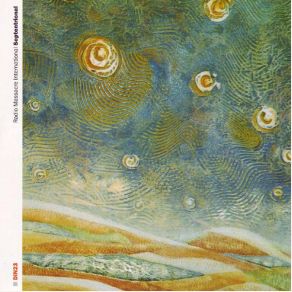Septentrional
Download links and information about Septentrional by Radio Massacre International. This album was released in 2006 and it belongs to Electronica, Rock genres. It contains 5 tracks with total duration of 56:13 minutes.

|
|
|---|---|
| Artist: | Radio Massacre International |
| Release date: | 2006 |
| Genre: | Electronica, Rock |
| Tracks: | 5 |
| Duration: | 56:13 |
| Buy it NOW at: | |
| Buy on iTunes $9.99 | |
| Buy on Amazon $8.99 | |
Tracks
[Edit]| No. | Title | Length |
|---|---|---|
| 1. | The First Cry... | 11:05 |
| 2. | Seven Sceptres for Sephulcrave | 11:43 |
| 3. | Trident | 11:19 |
| 4. | Searching Septentrional Skies | 9:19 |
| 5. | ...The Last Laugh | 12:47 |
Details
[Edit]The trust factor behind this set was quite astonishing, as Radio Massacre International blindly put their fate in the hands of DiN label head Ian Boddy. Presented with three hours worth of multi-track tapes, Boddy set to work editing and remixing, carefully crafting the 56-minute Septentrional album. It's a quite astonishing set, one that remains true to the band's musical vision and improvisational roots, yet gently prods them into new territory along the way, most notably on "Trident." This number kicks the set into a higher gear, being faster paced with more contemporary flavored rhythms than anything else on the album. The atmosphere is cooler too, the production a tad slicker in sound, the aura brighter, and even though this is by far the most "modern" styled of all the pieces, there are still enough echoes of the band's proggy, Krautrock flavored past to not thoroughly disconnect the trio from their roots. In contrast, spacy effects rain down across the intro to "Searching Septentrional Skies," robotic electro-monks chant in Gregorian style, until the sequenced synths finally swoop down and take over the piece. A rhythm reminiscent of that from Depeche Mode's "Master & Servant" kicks in, the textures weave ever thicker, the rhythm shifts, the mood alternately darkens and brightens, and the style pendulums from darkwave to new wave before surfing off on a wave of space-aged psychedelia.
"The Final Cry," meanwhile, slowly coalesces on the outer rim of a far-off galaxy, melodies rise from the ether, and a rhythm begins to form, strengthen, then finally take hold, propelling the number into life. The mood is dark, but somehow uplifting, the variations on a musical theme thicken, branch out, and build into a wondrous thicket of sound, while the rhythm drives along below. The epochal "Seven Sceptres for Sephulcrave" begins in a sepulcher, a collapsing one, for less than a minute in the rafters sound about to give in, the mood turns eerie, then majestic, before the dark skies open up and a beam of daylight shines through. Over the course of this phenomenal piece, entire civilizations rise and fall, grand heights are scaled, then darkness descends, until only the melancholy melody that aches of greatness reached and then lost remains. The album concludes with the highly experimental "...The Last Laugh," which begins in a flood of experimental effects, and returns the trio to their improvisational roots. Over five minutes pass before anything hinting at melody sweeps in, aural waves ebb and flow, serenity begins to take hold, and then an extended period of silence descends, eventually broken by a looped laugh and eerie effects, before the piece returns to the dead zone. A stunning offering and an amazing aural journey, taking the trio from their Berlin School roots into a future far more intriguing than even they, one expects, ever imagined.